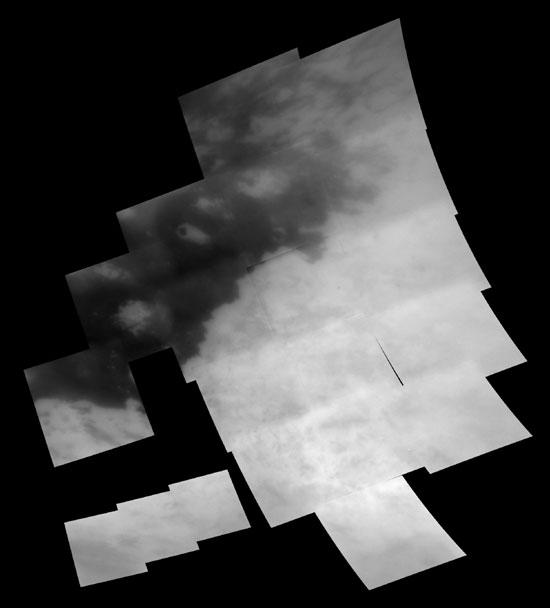This mosaic of images taken at 28 footprints shows the regional coverage taken during Cassini's second encounter of Titan on Dec. 13, 2004.
Cutting through the middle of the image is a sharp boundary between the bright region known as Xanadu Regio on the right and dark terrain to the left. This mosaic includes some areas seen at regional scales in October 2004 (see PIA 06124), as well as additional areas to the north and east not seen during that flyby. Among the new features seen in this mosaic is a strangely shaped bright feature near the center of the image as well as clouds near the bottom of the image (see PIA 06110).
The northern portion of the bright/dark boundary appears to be more complex than the arching and sharp boundary seen farther to the south. Cassini scientists continue to examine images such as this to determine the cause of this terrain.
The images in this mosaic have been processed to enhance surface features and sharpen brightness variations. All images were taken at a special filter in the near-infrared at 938 nanometers that provides the camera's best view of Titan's surface features. The images making up this mosaic were taken with the Cassini spacecraft narrow angle camera at distances ranging from 80,900 to 42,400 kilometers (50,300 to 26,300 miles) and have pixel scales ranging from 930 to 475 meters (3,050 to 1,560 feet). This mosaic is scaled to 1.2 kilometers (0.75 miles) per pixel and is centered at 5 degrees south latitude, 138 degrees west longitude on Titan. Black areas on this mosaic represent areas where images were not taken during this observation or were not returned from Cassini.
The Cassini-Huygens mission is a cooperative project of NASA, the European Space Agency and the Italian Space Agency. The Jet Propulsion Laboratory, a division of the California Institute of Technology in Pasadena, manages the mission for NASA's Science Mission Directorate, Washington, D.C. The Cassini orbiter and its two onboard cameras were designed, developed and assembled at JPL. The imaging team is based at the Space Science Institute, Boulder, Colo.
For more information about the Cassini-Huygens mission, visit http://saturn.jpl.nasa.gov and the Cassini imaging team home page, http://ciclops.org .
Image Credit:
NASA/JPL/Space Science Institute

